Council Meeting Newsletter (20 Jun 24)
Committee-of-the-Whole and Daytime Council Meeting
In the newsletter for this week, we’ll be looking at the items considered during the committee-of-the-whole and daytime council meetings on Thursday, 20 June 2024. Items of particular importance included the Victoria Housing Strategy Review Report for 2023, a council member motion on a response to anti-semitic activities and a council member motion on social services for unhoused individuals.
Committee-of-the-Whole
The committee-of-the-whole was called to order just a little after 9 am in Council Chambers with the mayor (as chair) and all councillors in physical attendance.
1276 and 1278 Gladstone Avenue: Rezoning Application
The committee heard a report from staff concerning a rezoning application for a development at 1276/1278 Gladstone Ave (Fernwood) seeking to rezone from R-2-T Zone, Two Single Family Dwelling District, to a new site-specific zone, increase the density from 0.30:1 FSR to 1.52:1 FSR, allow for multiple dwellings and commercial uses.
This application generated significant interest within the local community. Some council members mentioned the tension and division that was clear during a previous CALC meeting on the application. Residents raised concerns about the size of the development, specifically the height and the shadow area that would be created around the neighbourhood, in addition to concerns about a lack of parking facilities.
The design is a 4-storey building that will house 18 units comprised of 5 studio, 5 one-bedroom, 2 two-bedroom and 6 three-bedroom rental units. The developer intends to build a ground-level bakery, so they seek to rezone the parcels to mixed-use. The application does not include any parking facilities. However, CR-6 commercial zoning does require at least 8 commercial parking spaces (there will be a loading zone along the front, and an additional EV rideshare facility will be installed on the block). You can find the drawings provided by the developer here.
Overall, the committee was impressed with the application and design. It was noted specifically that the development exceeds the requirements of the recently passed Family Housing Policy by assigning 44% of units to 3-bedroom, family-friendly designs. Council members noted the public's interest and pointed to the developer meeting concerns in some instances, such as shadow concerns around the co-op vegetable gardens in the area.
Parking was raised as a concern by Councillor Stephen Hammond, particularly the lack of parking. Councillor Jeremy Caradonna touched on parking, asking questions about available parking within the neighbourhood and the carshare facility planned to be installed on the block. Councillor Marg Gardiner mentioned the need for a baker to park early in the morning. Staff replied that several options are available to people, including parking spaces in the immediate area.
Gardiner was also concerned about the garbage storage facilities (an issue raised by many local residents) and designs for the family-friendly units. It was mentioned that none of the 3-bedroom units are on the ground floor, and there is no elevator within the building, which would present obvious problems for families with members having mobility needs.
The application passed from the committee of the whole with Coleman, Gardiner and Hammond in opposition.
Development Cost Charges Review
The committee heard a report from staff about development cost charges (DCC). Broadly, a DCC is a mechanism enabled through provincial legislation that allows municipalities to charge set fees to building applicants through a statutory regime to assist in increased costs to public services related to the development. You can read more about them from the BC Government website here.
The consultation staff recommended that staff amend the Development Cost Charges bylaw for consideration by the council. Staff recommends increasing the cost charges and bringing them closer to other jurisdictions. It is particularly noteworthy to see how middling our present charge structure is compared to other municipalities within the province. Building in Victoria when it comes to contributing to public service costs through the DCC is certainly a bargain. You can see the comparisons in the images below.
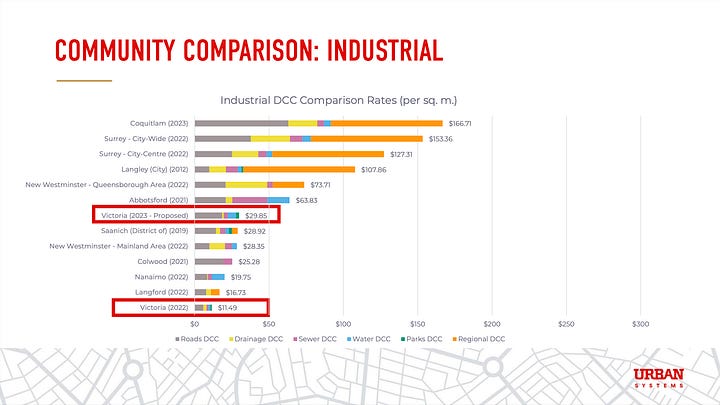
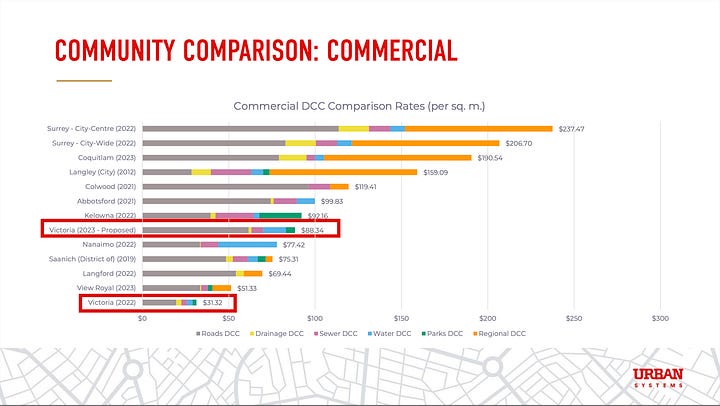
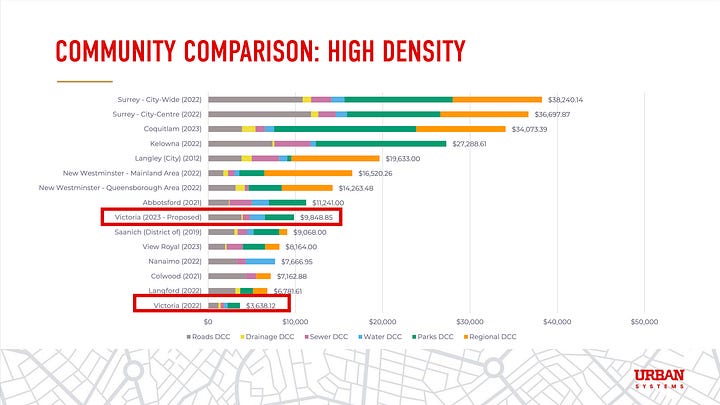
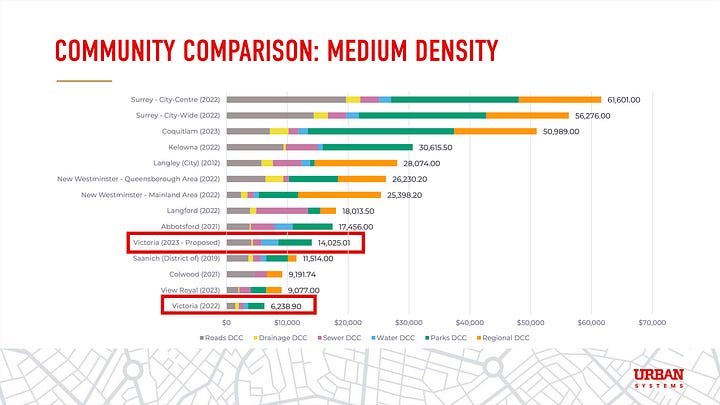
Any costs taken on by builders are going to impact the number of builds that are completed or even brought to fruition. You can think of viability for builders as a bar where projects either fall above or below. As government, markets, etc., add or remove costs, the bar rises and lowers, making more or less projects worth building. Staff estimated that 1% of potential builds would become unviable with the amendments to 2030 and roughly 6% to 2050.
Council members focused on this impact during their deliberation on the item. A proposal from the council is still being worked on by staff that will see a 100% reduction in DCC for all non-market rental housing builds. This will be administered through a grant alongside the DCC bylaw. Most of how the DCC can be structured and administered are governed by provincial law. Still, the council has latitude through grant programs and other mechanisms within OCP and housing regulations to ease burdens on developers. Councillor Dave Thompson said that this was a temporary measure and that after a review, if it proved to impact building rates negatively, then he would be seeking to lower the DCC.
Staff's recommendation passed, and we expect to see an amendment to the Development Cost Charges bylaw in the future.
Major Community Initiatives and Events Grant
After returning from a lunch break, the committee heard a report from staff concerning a proposed new major community initiatives and events grant. This item stems from the 2024 budget when the council directed staff to establish a grant of $559,170 to fund “support bold and transformative special events aligned with objectives in the 2023-2026 Strategic Plan.”
The recommendation from staff included four options: (1) approve the guidelines as developed by staff, (2) allocate $250,000 into the Cultural Infrastructure Grant program and create a new stream for Major Events under the Festival Investment Grant program, with the remaining funds, (3) rename the Community Initiatives to Major Event Fund and (4) provide alternative direction to staff.
In the end the committee decided to go with option one with amendments to the guidelines. There was a discussion around the table concerning staff’s proposal for a $1 million economic impact requirement. Councillor Caradonna presented a host of amendments that lowered the requirements from applications to have a proven record, and the economic impact was lowered to $100,000 (a number staff at one point remarked was “insignificant”).
There was a very clear division among council members. Councillor Hammond led one side, stressing that then the money should not be spent if their goal is not met by applicants. Councillor Caradonna led the other side, saying that the money was there to be spent on cultural and arts events, and bemoaned the council's failure if they could not encourage events with this money. It was a rare moment when the committee talked about the crux of an issue rather than passive-aggressively dancing around their motivations with questions to staff.
In the end, the spending side won the day. The recommendation to create the major event grant was passed with amendments that lowered the original burdens on applicants presented by staff.
In a noteworthy moment during the discussion, Councillor Caradonna sought to move the item to the daytime council meeting, saying that because we were already halfway through the year, they would need to get the terms up so applicants could take advantage of the funding in the remainder of the year. He said, “I know of two applicants waiting in the wings for this.” When it came back to Councillor Gardiner to speak, she took specific issue with his statement. She accused Caradonna of colluding with applicants to set terms for them to access the public money. This was extremely uncouth and out of line. Caradonna rightly took offence to the insinuation, and when he had a chance to speak again, he had staff pull up the City of Victoria grant website that had a page for the grant that was up since February, albeit without any information because the grant guidelines had not been approved.
Caradonna said that he had received communication from potential applicants because “we made a website for a grant that didn’t exist yet and had no information on it,” he called out Gardiner for her baseless accusation. In this instance, Councillor Caradonna was absolutely in the right, and I hope Gardiner will think twice about accusing a peer of something so serious without clear evidence.
Victoria Housing Strategy Annual Review Report 2023
After a motion to extend the meeting time from the original 2 pm schedule end time and a brief break, the committee received a report from staff on the city’s housing strategy for 2023. I’ve included a few key highlights from the report in the images below, and you can access the full report here (I recommend giving it a read; it is actually interesting).
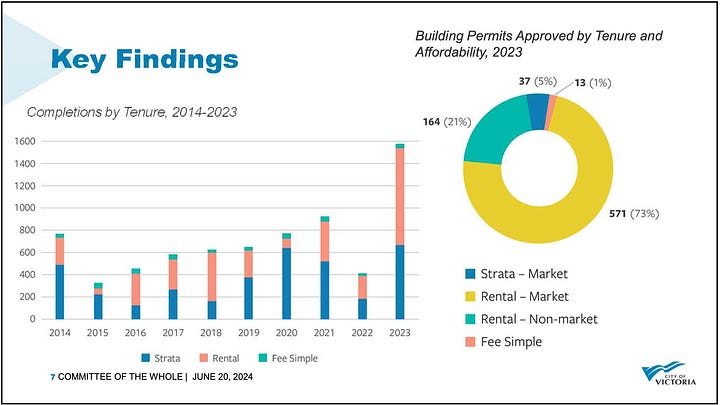
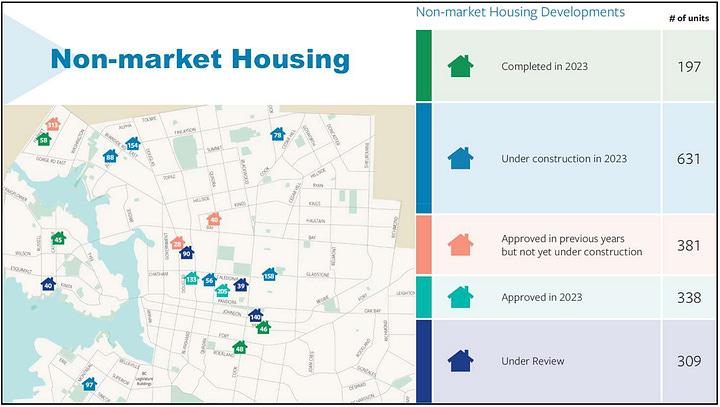
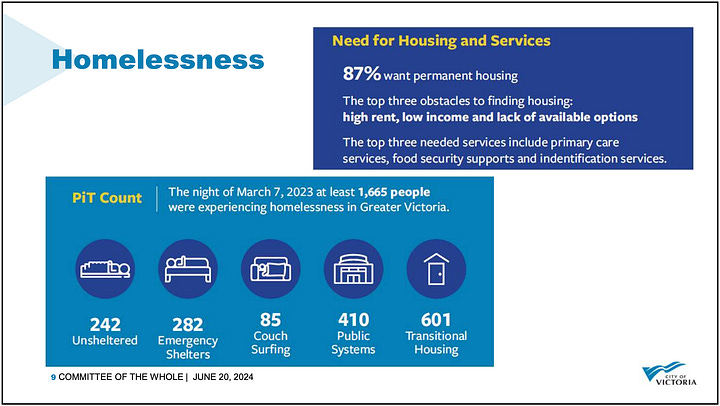
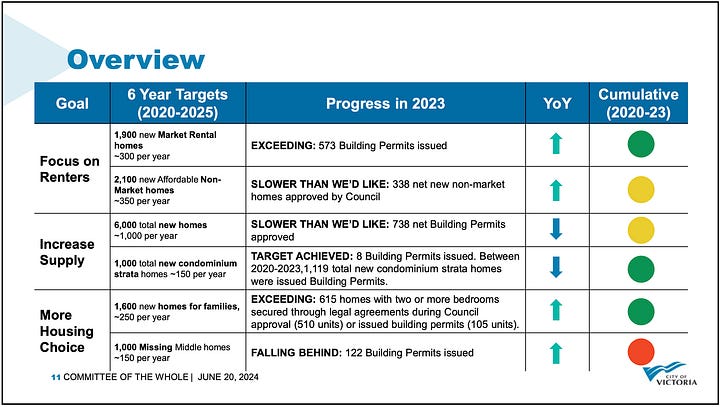
But here is the rub for me. This was a simple motion to accept the report. There is very little reason for debate and discussion around this matter. Unless there is a glaring error in the report or an issue with how it was presented by staff, it should just be a matter of receiving the report and moving on to the next item of business. But that is not what happened in committee. We spent 40 minutes going around the table so that each council member could add their spin and two cents on the report and its findings. Important items are contained within the report, but those should be highlighted through policy development by informing the council’s future housing decisions. There is no need to grandstand and spin the data in committee during public time.
It was a sad waste of time while the gallery was full of engaged citizens who wanted to hear a particular item on the agenda. By the time this item was considered, we had passed the 2 pm scheduled time. The entire 40 minutes was a shameful waste of everyone’s time. That is all I am going to say about the subject here.
Council Meetings Calendar
A motion was made to refer this item back to staff for further consideration concerning the practices of local municipalities. The motion was passed, and this item was not considered during the committee of the whole meeting.
Province of BC Bill 47 and Transit Oriented Area (TOA) and/or Transit-Oriented Development Area (TOD) in Victoria
This was a council member motion from Councillor Gardiner concerning the transit exchange/terminal along Government Street, adjacent to the Legislature Building. The motion would request that the province of BC recognize an area along the 700 block of Douglas (in front of the Victoria Conference Centre) as our TOA/TOD under Bill 47.
For background, newly introduced provincial legislation requires cities to identify transit areas with provisions for building height and density established by provincial law rather than local regulation. The purpose of the legislation is to encourage growth and development around transit hubs.
Our TOA will be established along Government Street adjacent to the Legislature Building. However, BC Transit has discussed and plans to move the exchange to an area in front of the Victoria Conference Centre. This motion would request that the province move the TOA to that location, given BC Transit's report on this plan.
There was discussion around the table concerning the implications of Bill 47, it is not entirely clear that everyone around the table is aware of the impact. They will need to get proper legal advice from city staff in order to properly assess the impact. The establishment of the TOA along Government given our present transit system, will be an agenda item for next week.
The motion passed after an amendment to direct the mayor to write a letter of request to the province in the future.
City of Victoria response to ongoing antisemitic actions
Councillor Gardiner presented this motion during committee-of-the-whole last week, but it was postponed until this meeting because of time constraints. Ironically, the committee did not get to this item within their scheduled meeting time. At any rate, discussion on the matter opened with an amendment from Gardiner herself. The amendment read:
That council direct staff to respond promptly to communications from the public regarding discriminatory or other actions intended to create hate and/or division in our community by:
1. assessing communications from the public which assert City funding support or otherwise links the City to organizations which advocate for discriminatory behaviour to
a. determine if any grant or other city funding is used directly or indirectly to support discriminatory activities, and
b. recommend continuing or altering City financial support for an organization involved with such discriminatory activities
2. prioritizing the removal of graffiti which is likely to be offensive, abusive, hateful or threatening in nature by
a. removing such graffiti on City public property
b. promptly notifying property owners of such graffiti on their property and their obligation to remove graffiti
The original motion was strictly about anti-semitism, and the amendment is more broadly about discrimination and offensive graffiti.
Councillor Susan Kim opened the discussion after Gardiner’s presentation and asked for a specific example or definition of “offensive, abusive, hateful or threatening” graffiti. Mayor Marianne Alto cleverly stepped in here before Gardiner could respond and directed the question to staff (this is her role as chair, and it was a smart move). Staff responded that while they do not have a specific definition or example, they could report that approximately 75% of graffiti removed by city staff is regarded as offensive or hateful and remarked a twofold increase over the past few years.
Members of the council directed questions to staff concerning the grant application process and specifically inquired whether or not discriminatory applicants are permitted to receive funds. Staff replied that regulations for grants specifically prohibit discriminatory applicants. Councillor Gardiner danced around mentioning Muslim Youth, their connection to Younus Kathrada, and the $5,000 the city has acknowledged they received in grant money, but she never said either by name.
The committee unanimously approved the motion with an amendment from Caradonna that changed “direct staff” to “reaffirm direction to staff,” given the responses that they already do everything contained within the motion.
Zoning for Social Services for Unhoused Victorians
This was an important and anticipated item on the agenda. It concerned a motion from Mayor Alto to remove barriers to creating social service space for unhoused persons within the city. The motion's recommendations are shown below.
The issue was discussed lengthyly, and it largely concerns public consultation and the distance from other social services. Councillor Gardiner also made a noteworthy amendment that would have prohibited the social service sites from being within proximity of a school, playground, daycare, etc., but the committee rejected this.
I am not going to discuss the discussion in detail because I am going to write an editorial on the topic and will be going much more in-depth with the item in that newsletter.
But I would like to mention something that happened during the debate that disturbed me as a stickler of parliamentary procedure. The committee was considering a motion made by the mayor, who also chaired the committee meeting. Robert’s Rules of Order at 43:29 clearly states the requirement of the chair to leave when they feel compelled to contribute to the debate.
I understand there are many moments during council meetings when the mayor offers comments or summarizes the debate on a particular item, and no one expects her to leave the chair every time she makes these often helpful comments. However, considering this was a motion of her own concerning controversial business, which she brought before the committee, she should have left the chair before opening up a debate.
There were a few instances when the mayor ruled an amendment out of order for not being in line with the spirit of the motion itself. This means the motion's mover was ruling on what their motion was about. This is a textbook example of partiality. Mayor Alto and Gardiner got into a spar, with Gardiner challenging a ruling of the chair. At that point, Alto was confusing her role as defender of her motion with that of the chair when she tried to rule it too out of order, prompting Gardiner to point out that she was challenging the chair.
I am fond of Mayor Alto when it comes to her ability to chair a public meeting. She is very good at it. But in this instance, for whatever reason, she overlooked her advice to lean on the wisdom and spirit of Robert’s Rules of Order. She brought a degree of prejudice to the chair during the debate and caused scandal during the minor altercation with Councillor Gardiner. I hope this is a learning moment moving forward.
At the end of the meeting, the motion passed with Councillors Gardiner and Hammond opposing it (Councillor Coleman was no longer in attendance, having to attend an acting mayor event).
At 6 pm, a motion to adjourn the committee-of-the-whole meeting was passed.
Daytime Council Meeeting
The daytime council meeting was called to order following the committee-of-the-whole.
The council considered five bylaw items and a new item related to the liquor licence application for 586 Johnson Street (Forge Axe Throwing). Among the bylaws, there was nothing significant to report.
Regarding the liquor licence application, there was discussion over the merits of the response from the city to impose sound-related restrictions on the business under the liquor licence application. Councillor Caradonna was most clear in his remarks, calling the move by the city a mistake and regretting taking part in using the liquor licence to address community concerns around sound with the business.
The council moved to permit the licence without any further restrictions.
The council then moved into a closed portion, which ended my reporting ability.
Your fly on the wall.



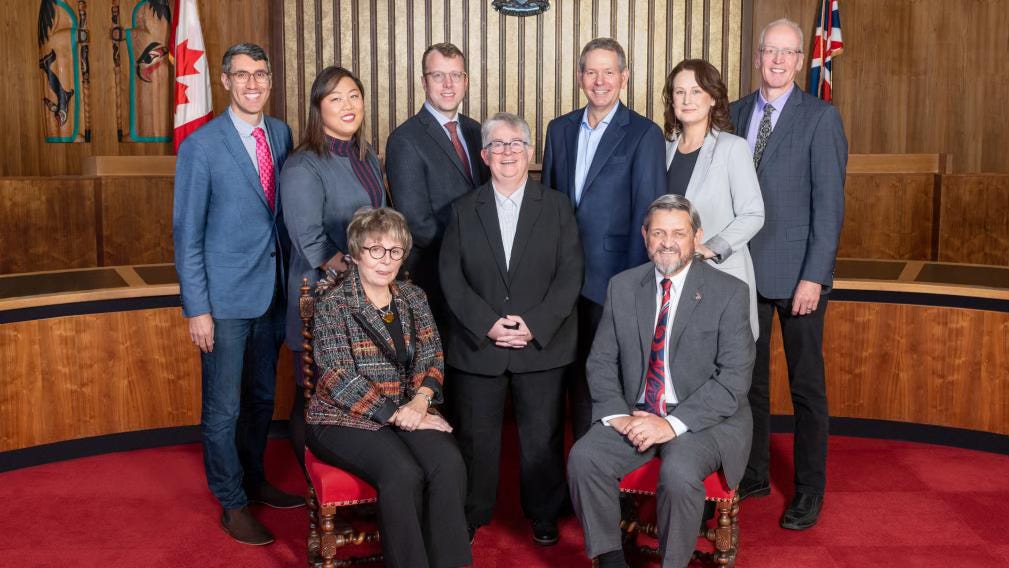
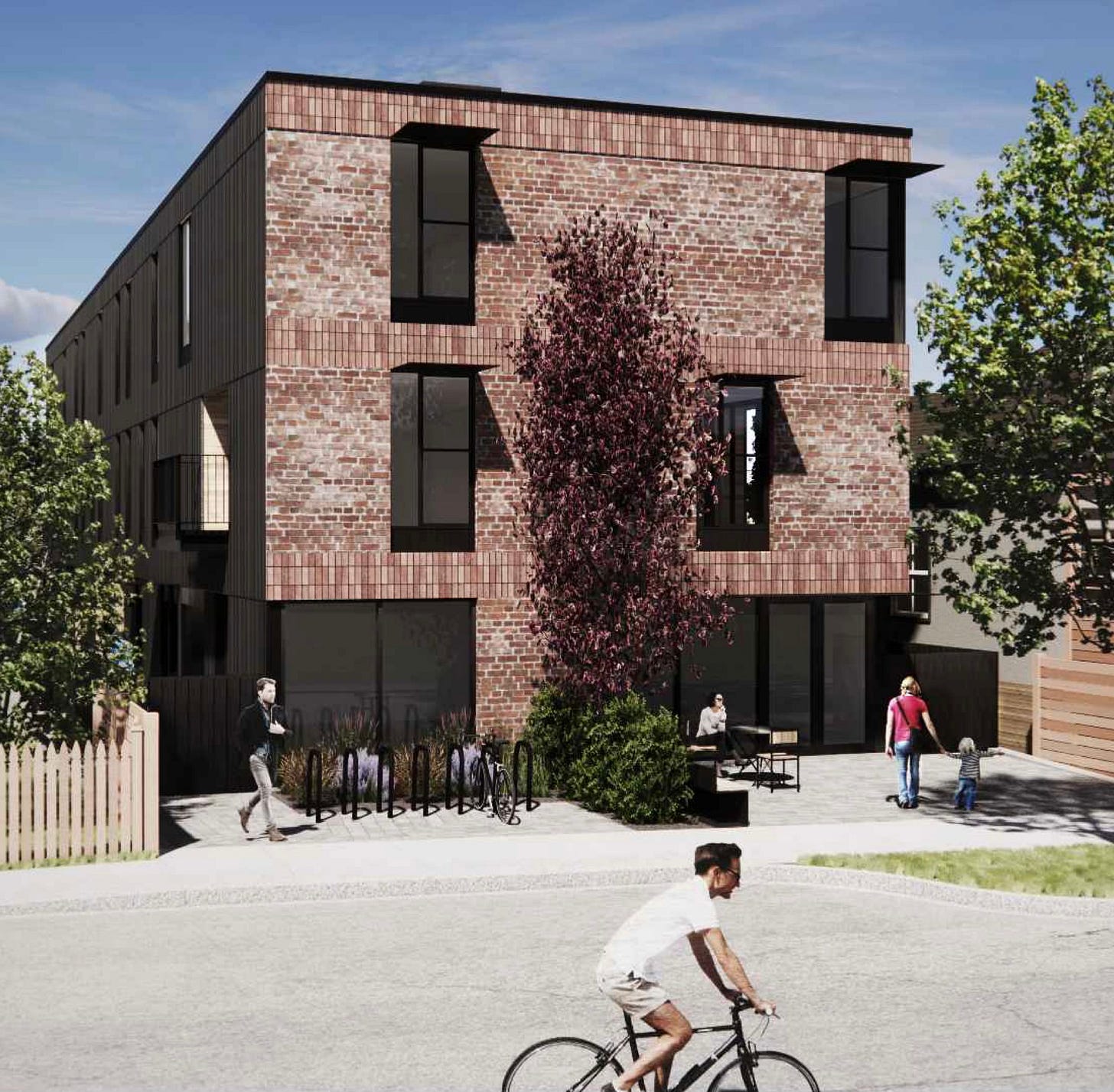
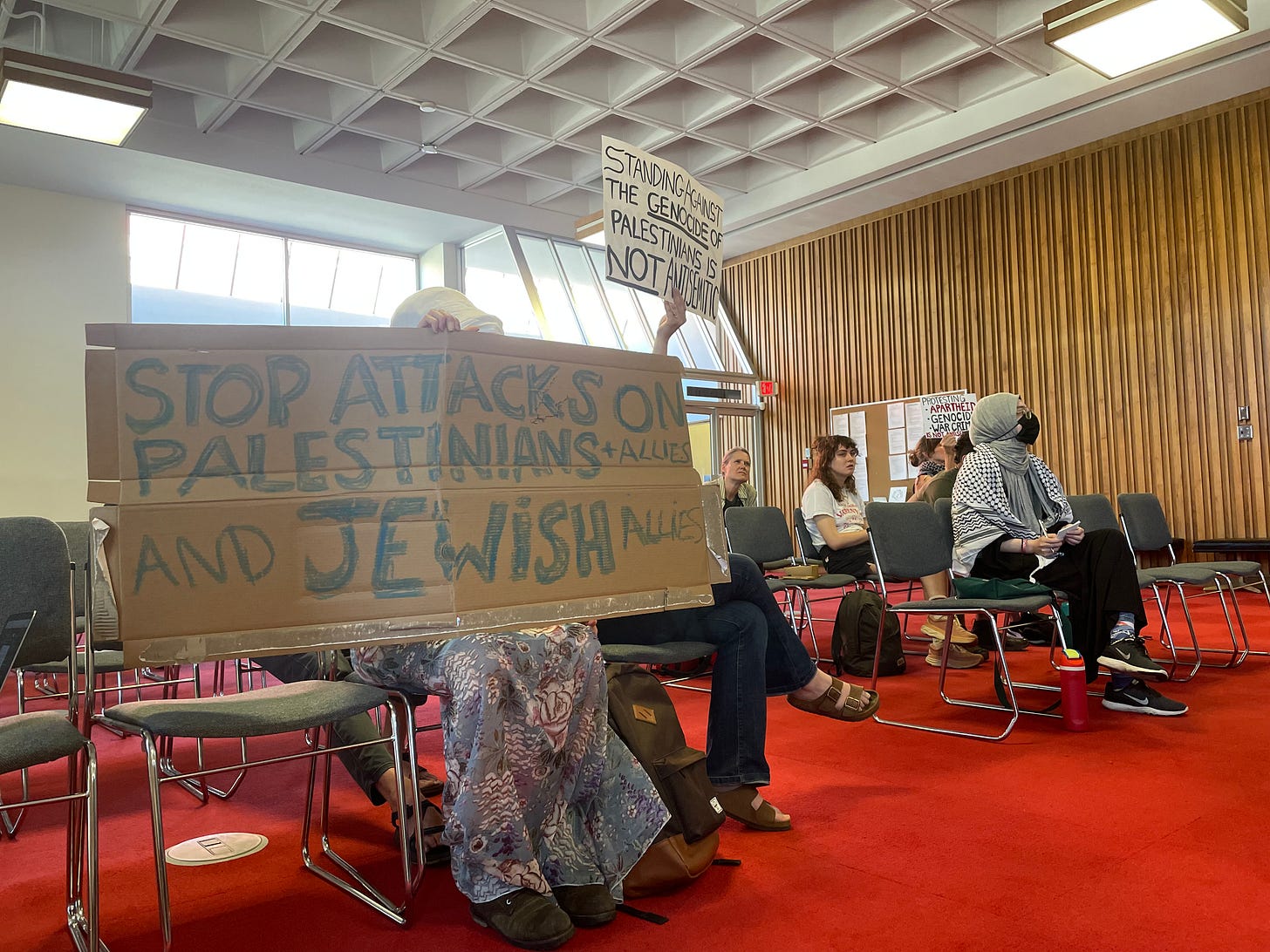

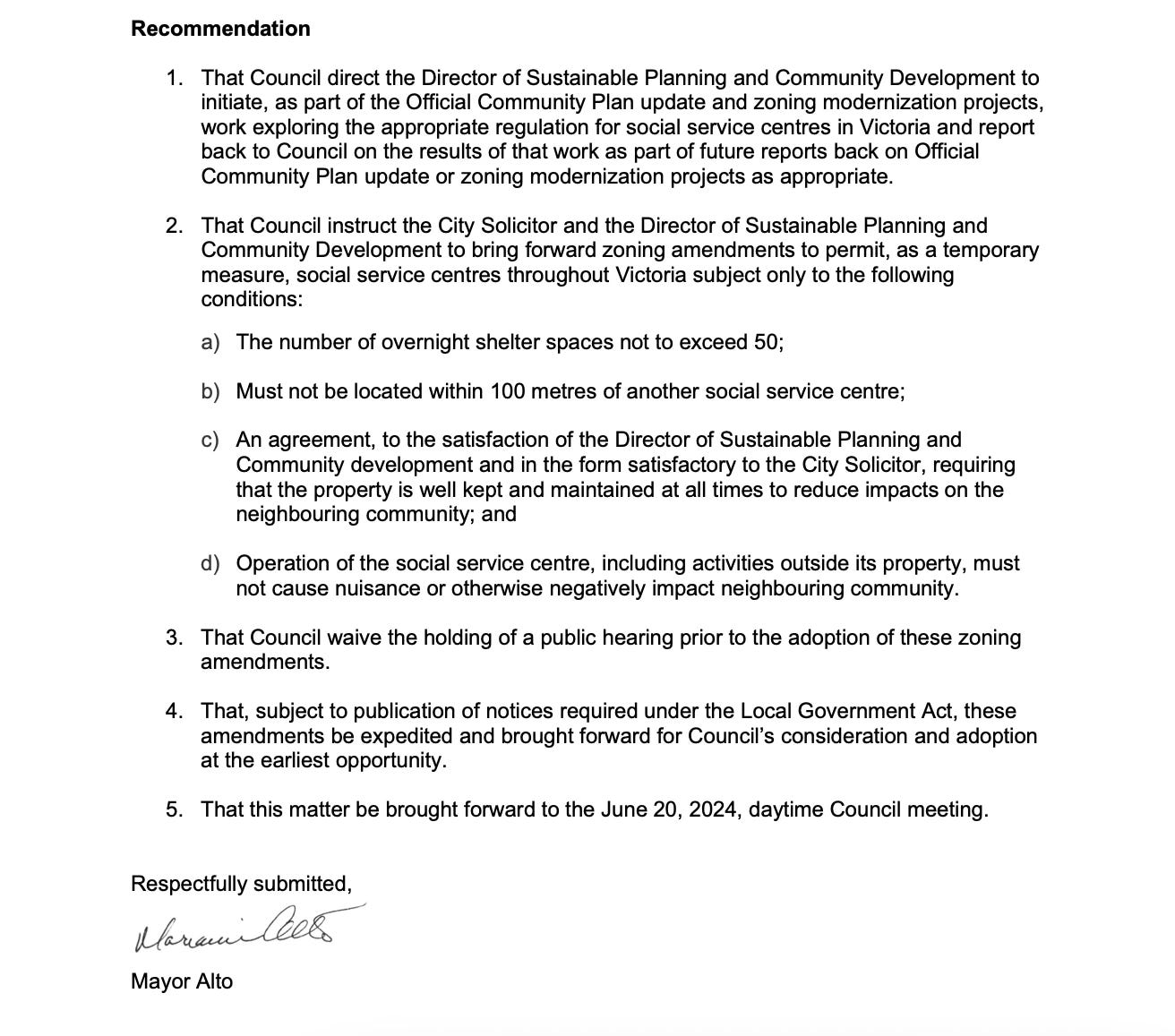
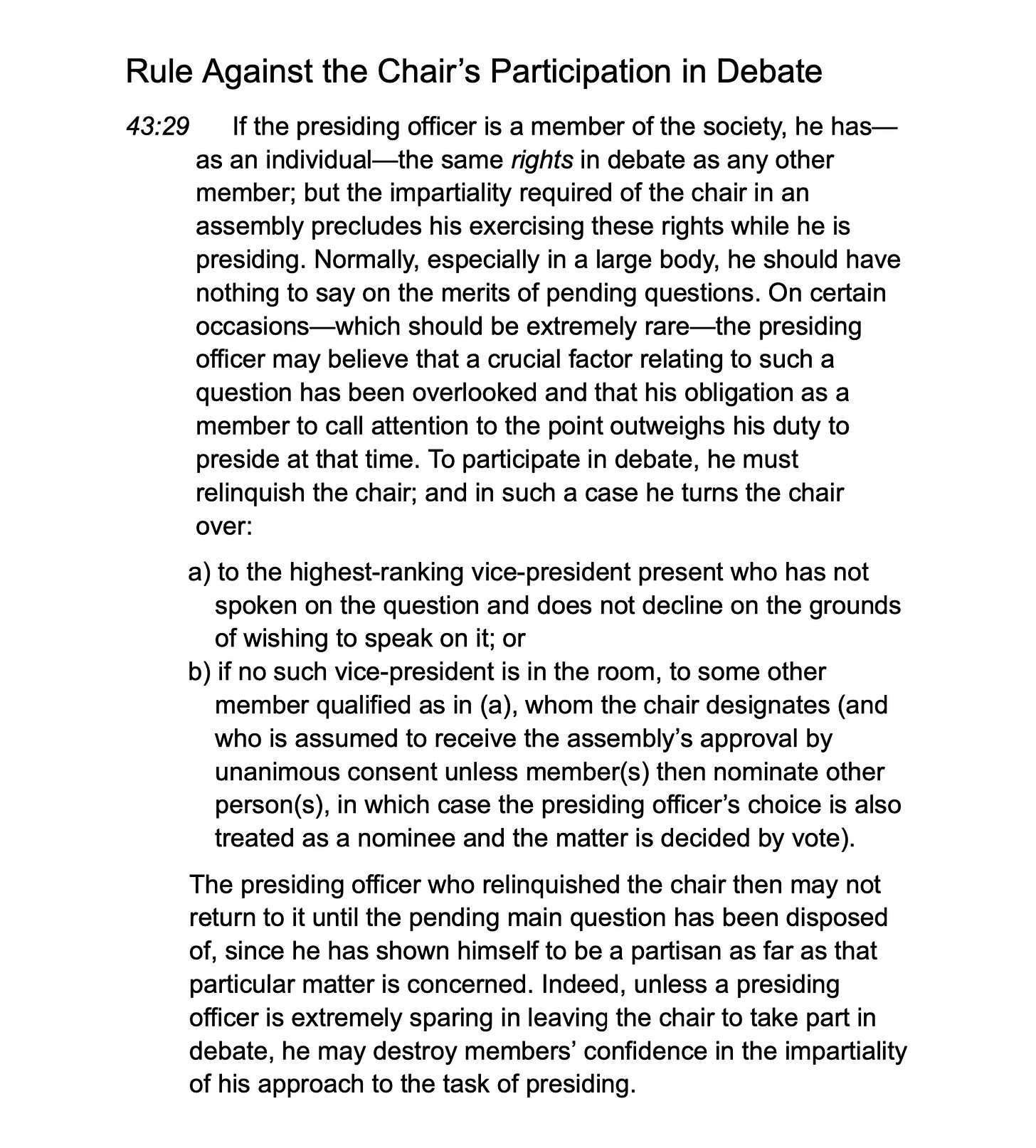

Just a suggestion. Maybe put bullet points of meeting topics under the header?